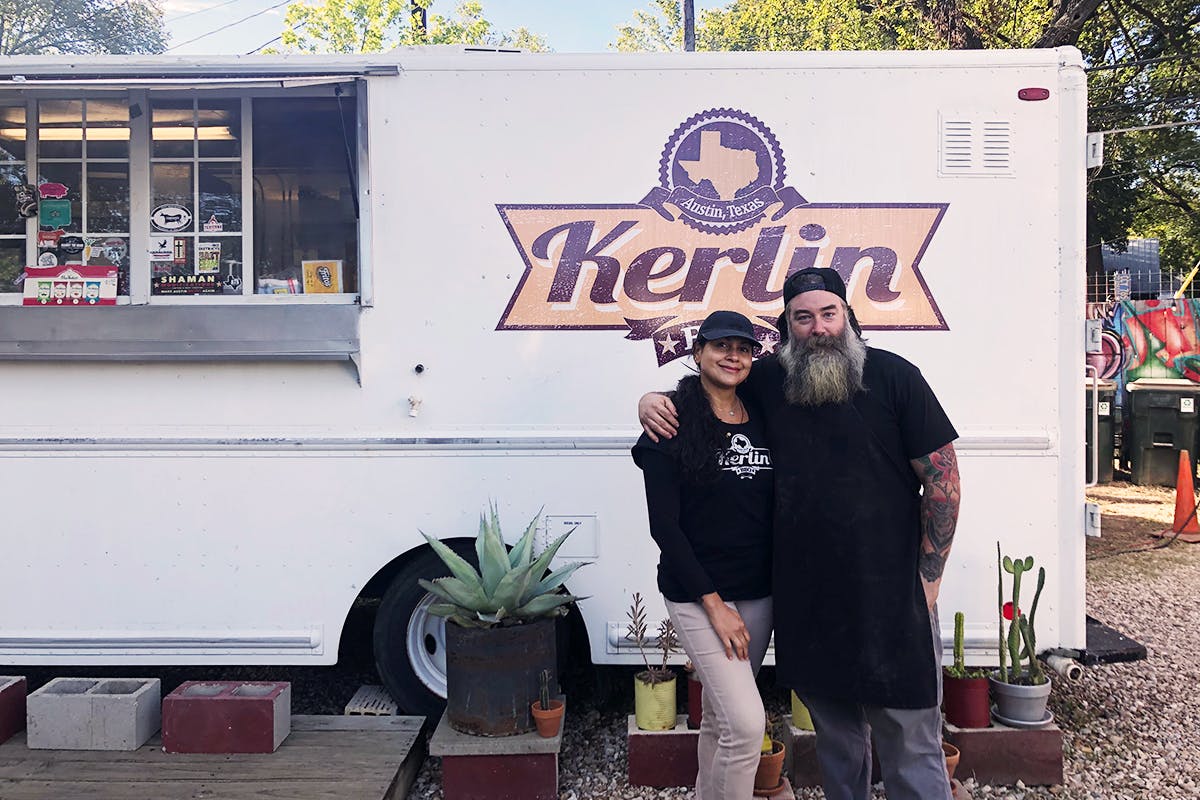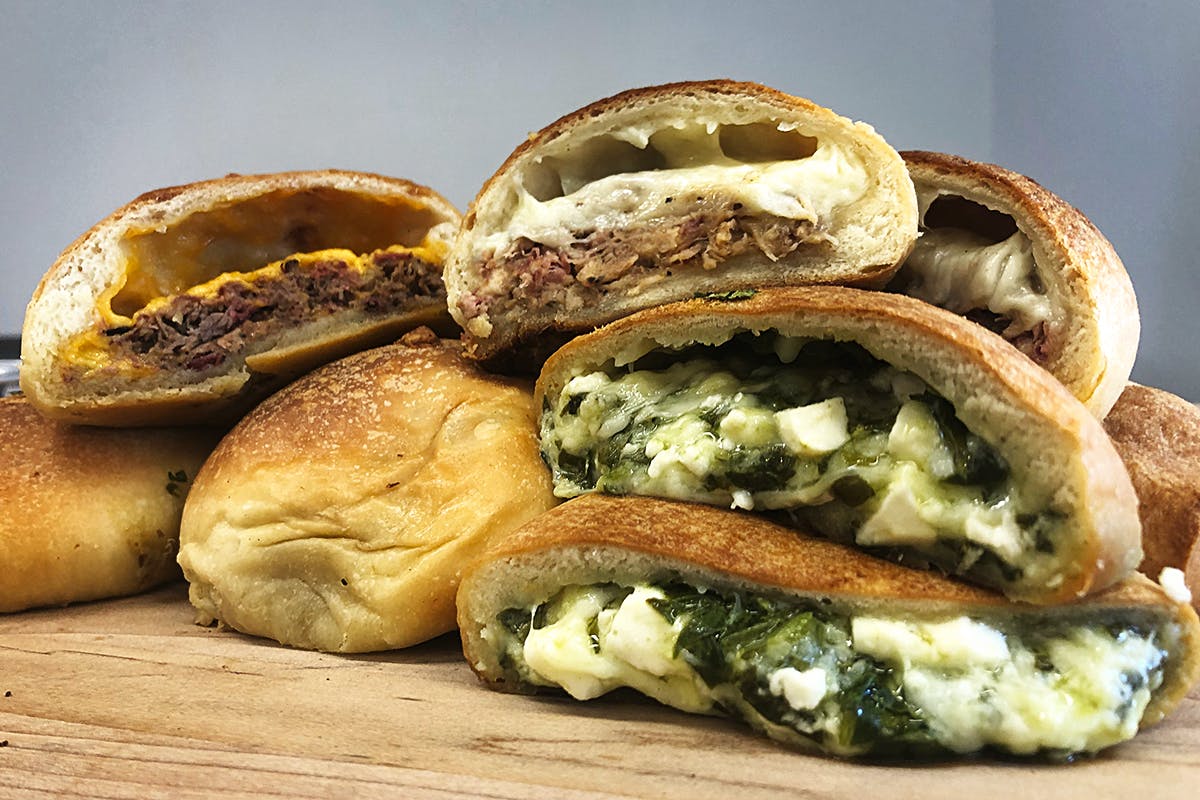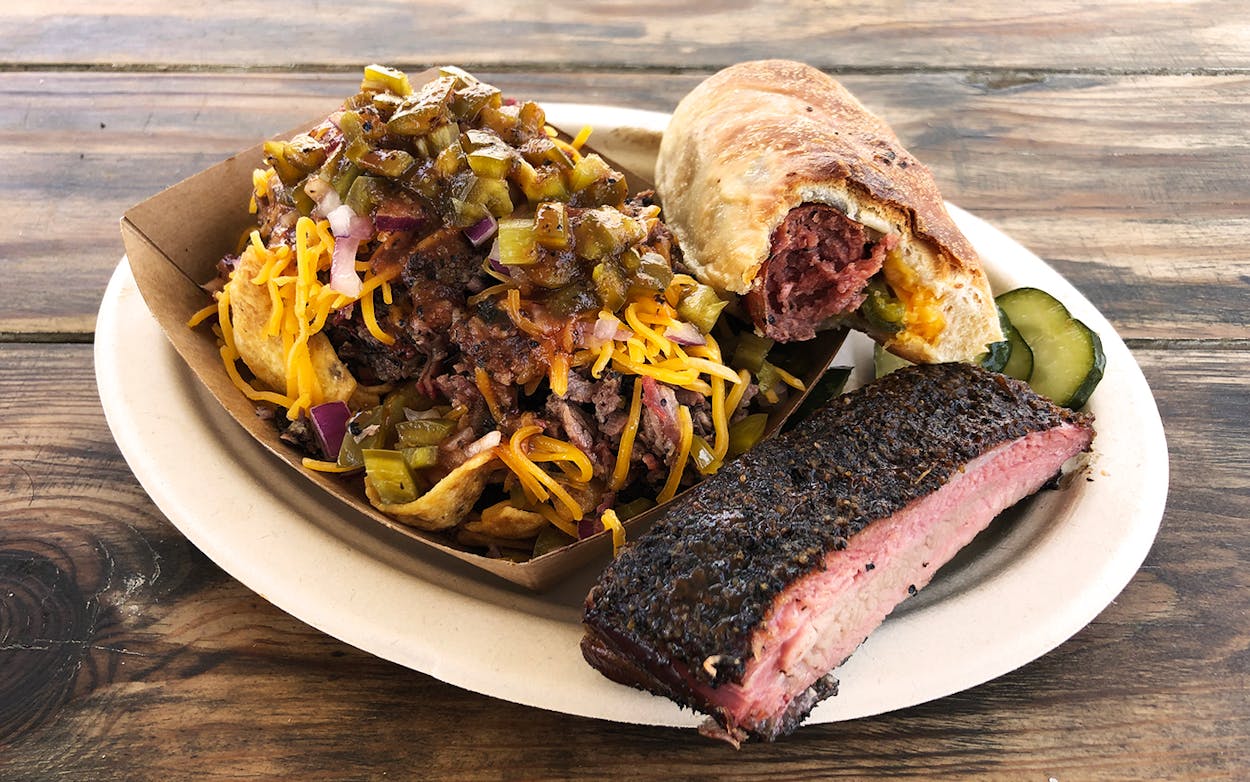Amelis Kerlin never saw a kolache while growing up in Barquisimeto, Venezuela. She moved to Texas 22 years ago and has since had plenty of kolaches, but not the fruit-filled variety you’ll find in the towns of West or Ellinger. Kerlin was introduced to kolaches through the pigs in a blanket at shops with the word “Donut” in their names. “The little wiener and hot dog thing,” she said. At the Kerlin BBQ food truck she’s operated with her husband, Bill, in Austin since 2013, they often had leftover meat. She took the extra home and made empanadas, arepas, and even lasagna with brisket, but questioned, “How much brisket can I eat?” Kerlin thought a kolache would be the perfect vehicle for turning a profit on those leftovers. Today they’re almost as popular as the barbecue.
Kerlin didn’t scour the state doing kolache research before developing a dough recipe. She just did a Google search for “kolache dough.” The first batch was too dry, “like a biscuit,” she said. The second batch was too sweet, and still too dry. “I don’t like recipes. I just blend stuff together. That’s how I learned to cook with my mother and my grandmother,” she said, and by the third attempt, she’d gotten it right. “It’s like perfect, I think,” she said in a way that didn’t sound like bragging.
For the kolaches at the Kerlin BBQ trailer, she started with a smoked sausage link inside the dough. “They called it kolaches, so we call it kolaches,” Kerlin said, referring to the donut shop nomenclature. Then she developed the brisket and cheddar, now known as the “Kerlache.” Later they added pulled pork with jack cheese and a vegetarian spinach and feta variety. The latter can be had on Saturdays, and the other three are available at the trailer at 11 a.m. every day Kerlin BBQ is open.
Type the word “kolache” online in the vicinity of a photo containing protein inside bread, and you’ll be subjected to an onslaught of klobasnek pedantry. Most of the people correcting you aren’t trying to be helpful as much as letting you know that they’ve been educated (some by Texas Monthly) about the proper term from the old country for meat enveloped in sweet dough. The thing is, the term “klobasniki” was made up in Texas. At least that was the claim made by Wendel and Georgia Montgomery, the late founders of the now closed Village Bakery in West. The couple said they coined the term when they started wrapping sausages with their kolache dough.

The term was derived from “klobása,” the Czech word for sausage, and means “little sausage.” Nowadays klobasnikis contain a lot more than just sausage. Plenty of businesses built on kolaches and klobasnikis, like the Kolache Factory in Houston, don’t bother to make the distinction, and there are far more donut shops in Texas serving pigs in a blanket as kolaches than kolache bakeries making traditional fruit kolaches. The proper use of “klobasniki” is on the rise in Texas, but some still argue about how it should be spelled and pluralized. It can all get confusing, and Amelis Kerlin said she’s sticking with the definition of “kolache” she was first introduced to in Texas. Besides, if a burrito is really a taco, give a Venezuelan girl a break when she writes “kolaches” on her menu to describe chopped brisket and cheese inside a ball of sweet dough.
Kerlin added the kolaches to the menu in late 2014. She knew she had a hit when she stayed up that New Year’s Eve making 80 of them to serve the morning of New Year’s Day. “It was so freezing that morning,” she remembered, but it didn’t really matter. The kolaches were gone in 40 minutes. “I was so happy because you know when you’ve got something so good and people like it. It’s like my adrenaline went high and was like, ‘I need to make more, I need to make more,’ but it wasn’t because of the money,” Kerlin said. “I like to make people happy.”
The barbecue truck started opening early to sell kolaches, and for a time in 2015 they switched to serving only kolaches every day except Fridays. But the couple refocused on barbecue and eventually launched a dedicated kolache truck in 2017 serving varieties stuffed with chorizo, eggs, and cheese; with mushrooms, caramelized onions, and fontina; and another with membrillo (the quince paste) and manchego cheese. That was the height of Kerlin’s kolache-making, but it grew tiring along with the workload that comes with barbecue, and they scaled back.

Remember that Amelis Kerlin isn’t just the kolache baker at Kerlin BBQ. She and her husband split all the barbecue duties. They can both run the smoker and manage the truck alone if necessary. “I’m very passionate about the barbecue,” she said. “It’s a lot of work, you know, but when I see the final result, and I touch that brisket and the juice comes out…ohhh.” She still eats brisket every day.
Once the barbecue has all been served, and the truck is closed for the day, Kerlin starts prepping the 120 kolaches she and her sister Jennifer Santamaria will bake fresh the next day. They make the dough, stuff the kolaches, and cook them all inside the tiny trailer. Three ovens hold a total of 72 kolaches at a time. You’ll smell plenty of wood smoke walking up to the trailer, but when the window opens, it smells like a bakery inside. “Some haters are like, ‘Why you don’t make more? Why are you sold out?’ I’m like, I wish you could work in my little kitchen,” she said with a laugh. “I do magic to make people happy with my kolaches.”
The Kerlins have considered expanding the kolache business into a commercial kitchen. “If I could have a shop just to make kolaches, holy moly, I could make so many flavors,” she said with a smile, though she’d miss smoking barbecue too much. “If I would like to focus on the kolaches only, I would have to try to separate myself a little from Kerlin BBQ, and I do love my business.”
The trailer just relocated to a new spot. They’d been behind the Veracruz All Natural taco truck on Cesar Chavez since opening, but that lot will soon be sold, so they needed a new home. “We wanted to stay in this neighborhood because we’ve been here since the beginning,” Bill Kerlin told me. Their new spot is a few blocks east on Cesar Chavez at the East Side Food Park. The barbecue, especially the ribs and brisket-topped Frito pie, is as good as ever, and the kolaches are even tastier than I remembered them.
The brisket and pulled pork varieties go for $4. The spinach and feta and the jalapeño and cheese sausage kolaches are $4.50. They can sell out quickly, especially on weekends, so the Kerlins suggest that customers pre-order. The brisket and cheddar kolache is still the most popular. “I was making kolaches because I had leftover brisket,” Amelis noted. “Now it’s to the point that I have to smoke extra brisket just to make kolaches.”








